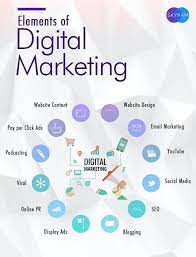Digital Marketing for Financial Advisors: Reaching New Heights in the Digital Age
In today’s fast-paced digital world, traditional marketing methods alone are no longer sufficient to reach and engage potential clients. Financial advisors, just like any other business, need to embrace the power of digital marketing to stay competitive and grow their client base.
So, what exactly is digital marketing, and how can financial advisors leverage it effectively? Digital marketing encompasses various strategies and techniques that utilize online platforms to promote products or services. For financial advisors, it offers a unique opportunity to establish a strong online presence, build trust with prospects, and ultimately drive conversions.
Building an Effective Website
A well-designed website is the foundation of any successful digital marketing strategy. It serves as your virtual office where potential clients can learn about your services, expertise, and approach. Ensure that your website is visually appealing, easy to navigate, and optimized for mobile devices.
Include informative content that showcases your knowledge and positions you as an authority in the financial industry. Consider creating a blog section where you can regularly share valuable insights on topics such as investment strategies, retirement planning, or tax optimization.
Search Engine Optimization (SEO)
When potential clients search for financial advice or services online, you want your website to appear at the top of search engine results pages (SERPs). This is where SEO comes into play. By optimizing your website with relevant keywords and improving its overall structure and performance, you increase its visibility in search engines like Google.
Invest time in keyword research to identify the terms commonly used by people searching for financial advice. Incorporate these keywords naturally into your website’s content, meta tags, headings, and URLs. Additionally, consider creating high-quality backlinks from reputable websites in the finance industry to further enhance your website’s authority and visibility.
Content Marketing
Content marketing is a powerful tool for financial advisors to educate, engage, and build trust with potential clients. Create informative and valuable content such as articles, videos, or infographics that address common financial concerns and provide practical solutions.
Distribute your content through various channels such as social media platforms, email newsletters, or guest posting on industry-related websites. By consistently delivering valuable content, you position yourself as a trusted resource and increase the likelihood of attracting and retaining clients.
Social Media Marketing
Social media platforms provide an excellent opportunity to connect with your target audience on a more personal level. Identify the platforms where your ideal clients spend their time and establish a presence there. Share relevant content, engage in conversations, and respond promptly to inquiries or comments.
Consider running targeted advertising campaigns on social media platforms to reach a wider audience. Utilize advanced targeting options to ensure your ads are shown to individuals who match your ideal client profile, increasing the chances of generating quality leads.
Email Marketing
Email marketing remains one of the most effective ways to nurture relationships with potential clients. Collect email addresses through your website’s opt-in forms or other lead generation strategies. Send regular newsletters containing valuable insights, updates on market trends, or exclusive offers.
Personalize your emails based on recipients’ interests and preferences to make them more engaging. Additionally, use automation tools to send personalized follow-up emails based on specific actions taken by prospects on your website or during previous interactions.
Measuring Success with Analytics
To ensure the effectiveness of your digital marketing efforts, it is crucial to track and analyze key metrics using web analytics tools like Google Analytics. Monitor important indicators such as website traffic, conversion rates, engagement metrics, and the performance of specific marketing campaigns.
Based on the insights gained from analytics, make data-driven decisions to optimize your digital marketing strategy. Test different approaches, measure their impact, and continuously refine your tactics to achieve better results over time.
As a financial advisor, embracing digital marketing opens up a world of opportunities to connect with potential clients and grow your business. By building an effective website, implementing SEO strategies, creating valuable content, leveraging social media platforms, utilizing email marketing, and analyzing data, you can reach new heights in the digital age.
Remember that digital marketing is an ongoing process that requires dedication and continuous adaptation to stay ahead in a rapidly evolving landscape. Embrace the power of digital marketing today and position yourself as a trusted financial advisor in the online world.
6 Essential Digital Marketing Strategies for Financial Advisors to Thrive Online
- 1. Define your target audience
- 2. Build a professional website
- 3. Utilize search engine optimization (SEO)
- 4. Develop engaging content
- 5. Leverage social media platforms
- 6. Implement email marketing campaigns
1. Define your target audience
Defining your target audience is a crucial first step in any successful digital marketing strategy for financial advisors. By clearly identifying and understanding who your ideal clients are, you can tailor your marketing efforts to resonate with their needs, preferences, and pain points. This allows you to create targeted content, select the most effective communication channels, and craft compelling messages that will attract and engage your desired audience. By narrowing down your focus to a specific target audience, you can optimize your marketing budget and efforts, ensuring that you reach the right people with the right message at the right time. Ultimately, defining your target audience sets the foundation for building meaningful connections and driving conversions in the digital realm.
2. Build a professional website
Building a professional website is a crucial step for financial advisors looking to establish a strong online presence. A well-designed website not only serves as a virtual office but also showcases your expertise and builds trust with potential clients. It should be visually appealing, easy to navigate, and optimized for mobile devices. By incorporating informative content and creating a blog section, financial advisors can demonstrate their knowledge and position themselves as authorities in the industry. A professional website is the foundation of an effective digital marketing strategy, providing a platform to attract and engage clients in the digital age.
3. Utilize search engine optimization (SEO)
To effectively market their services online, financial advisors should harness the power of search engine optimization (SEO). By implementing SEO strategies, advisors can improve their website’s visibility in search engine results, making it easier for potential clients to find them. This involves conducting keyword research to identify commonly used terms related to financial advice and incorporating them naturally into website content, meta tags, and headings. Additionally, building high-quality backlinks from reputable finance websites can further enhance a website’s authority and visibility. By utilizing SEO techniques, financial advisors can increase their online presence and attract a steady stream of qualified leads.
4. Develop engaging content
Developing engaging content is a crucial tip for financial advisors looking to succeed in digital marketing. By creating content that is informative, valuable, and relevant to your target audience, you can capture their attention and establish yourself as an authority in the field. Engaging content can take various forms, such as blog posts, videos, infographics, or podcasts. It should address common financial concerns and provide practical solutions that resonate with your audience. By consistently delivering high-quality content, you can build trust, foster engagement, and ultimately attract and retain clients in the competitive digital landscape.
5. Leverage social media platforms
One crucial tip for financial advisors in their digital marketing strategy is to leverage social media platforms. Social media offers a powerful avenue to connect with potential clients on a more personal level and establish a strong online presence. By identifying the platforms where their target audience spends time, financial advisors can share valuable content, engage in conversations, and respond promptly to inquiries or comments. Additionally, running targeted advertising campaigns on social media platforms allows advisors to reach a wider audience and generate quality leads. With the right approach, social media can be an invaluable tool for financial advisors to build trust, showcase expertise, and ultimately grow their client base in the digital age.
6. Implement email marketing campaigns
Implementing email marketing campaigns is a crucial tip for financial advisors looking to expand their reach and nurture relationships with potential clients. By collecting email addresses through opt-in forms on their website or other lead generation strategies, advisors can send regular newsletters containing valuable insights, market updates, or exclusive offers. Personalizing emails based on recipients’ interests and utilizing automation tools for targeted follow-ups can greatly enhance engagement. Email marketing allows advisors to stay top-of-mind with prospects, build trust over time, and ultimately increase the likelihood of converting leads into loyal clients.



